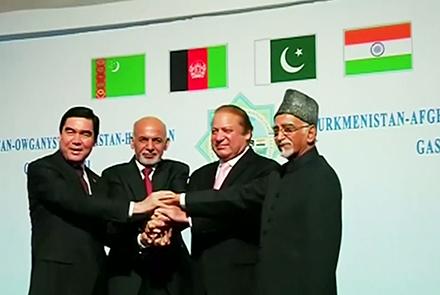The Ministry of Mines and Petroleum (MoMP) on Wednesday said the government has taken the necessary steps to implement Turkmenistan-Afghanistan-Pakistan-India (TAPI) pipeline in the country.
The MoMP added that the Afghan government is ready to roll out the project in its country. Construction work on the TAPI pipeline is likely to start in Afghanistan in February, the ministry said.
The areas where the pipeline is expected to run through have also been finalized, said the ministry.
The project will transport gas from Turkmenistan to Afghanistan, Pakistan and India via a 1,814km pipeline.
According to MoMP, the Afghan government has worked on a number of programs to lessen the impact on areas the project will run through and on acquiring the needed land.
“We have undertaken the necessary arrangements in the security sector and provided facilities for the implementation of the project, a special team has worked on it,” said Abdul Qadeer Mufti, spokesman for the ministry of mines and petroleum.
Economic experts scrutinize TAPI economic privileges
“Government needs to come up with a working security strategy to prevent destructive activities around the project; secondly we need to develop a national consensus for the support of development. The people of Afghanistan should mobilize in support of these projects,” said economic analyst Sayed Mohammad Zia Danish.
In Afghanistan, the TAPI pipeline will be constructed alongside the Kandahar–Herat Highway in western Afghanistan, and then via Quetta and Multan in Pakistan. The final destination of the pipeline will be the Indian town of Fazilka, near the border between Pakistan and India.
Afghanistan is expected to get $500 million USD in transit duties annually from the project.
The pipeline will be 1,735 kilometers long and have the capacity of transferring 33 billion cubic meters of gas from Turkmenistan to Pakistan and India through Herat, Farah, Helmand and Nimroz provinces of Afghanistan.

